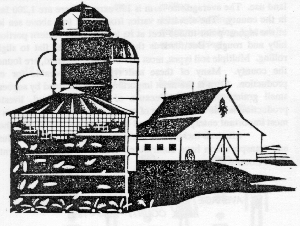 E-Mail The Family Farm Project
E-Mail The Family Farm Project
Feedgrains and other staple crops such as corn, wheat, and soy beans are marketed through agricultural brokers, located throughout the county. Farmers bring in their crops which are then weighed. If grains have been dried before they are brought to the market, they will bring a higher price, but in all cases the prices are determined by the world-wide market for these crops. Payment for these crops is made in connection with government contracts and subsidy plans.
Livestock is marketed differently. One way large scale livestock farmers, such as the Hawks of Howard Township, can market their goods is through a contract with a processor. In the Hawks' case, they raise 70,000 turkeys annually, from hatchlings to full grown birds, which they then sell to Bil-Mar Foods (the Mr. Turkey label), a company committed to maintaining part of its supply from independent farmers.
Larger animals, such as beef cattle are sold at auctions. There are weekly Knox County livestock auctions on Wednesday afternoons, in addition to annual feeder auctions which are held in late fall. Among feeder auctions, there are small scale evening 4-H auctions for kids who want to raise a calf to take to the fair. There are also larger scale day-long auctions for farmers who raise beef for a living.
Richard Beckley, who raises cattle in Jackson Township, is one such farmer. Born in early spring, his calves weigh about seventy five pounds. He raises them until November, when he takes 500 pound cattle to feeder auctions.
These auctions are advertised ahead of time through flyers and pamphlets containing listings of the cattle, including the name and reputation of the farmer, as well as pictures, vital statistics and information about the lineage of each beef steer.
At the auction, each cow is led around a ring as the auctioneer lists its good qualities and takes bids. The highest bidder pays the cashier, then makes transportation arrangements with the former owner. The new owner then "feeds them out" (or fattens) the cattle for about a year, until they reach a weight of roughly 1,000 pounds. Then they are sold and slaughtered.
Specialty products, such as organic foods, which can be differentiated from homogeneous crops, are sold in special markets and can demand a higher price. Other specialty goods, such as hydroponic tomatoes can also bring in higher prices through different marketing techniques.
Don and Janet Hawk market their hydroponic tomatoes by knocking on doors and explaining the good qualities of their product. When they began the tomato operation, they approached local resteraunts and grocery stores to make personal contacts and find buyers. They developed relationships with a number of regular clients, and now have a weekly routine of calling produce managers and other customers to take the weekly orders. Then Don, Janet, or their son Delbert delivers the produce to the grocery stores personally. Don usually conducts a follow-up call in the middle of the week to see if further deliveries are needed for the weekend. The high quality of their product has made the tomatoes widely successful, and the demand has become larger than the supply.


 E-Mail The Family Farm Project
E-Mail The Family Farm Project